

Beyond Borders: The Noto Peninsula Earthquake and the Hongkonger Community’s Response
Anna Tanaka
Director, Japan Hongkongers Association
June 17, 2024
Established in 2020, the Japan Hongkongers Association (JHA) aims to forge a strong support network for Hongkongers residing in Japan, focusing on community building, cultural exchange, and mutual assistance. Rooted in values of empathy, unity, and active engagement, JHA plays an important role within the Hongkonger community in Japan and acts as a bridge between Hongkongers and the Japanese community.
On January 1, 2024, a devastating magnitude 7.6 earthquake struck the Noto Peninsula in Ishikawa Prefecture. JHA recognized the urgent need for quick action. Utilizing our network and resources, the association mobilized Hongkongers around the world to take part in relief activities for the earthquake-affected areas, including a donation campaign that collected 65 million yen in three weeks.
Cultural Background and Motivation for the Donation Campaign
Many Hongkongers are immersed in Japanese culture from a young age through popular media like comics, animation, and J-pop. This exposure to Japanese culture sparks an appreciation for Japanese traditions, art, and lifestyle, influencing everything from culinary preferences to fashion and entertainment choices. In the first half of 2023, Hong Kong, with a population of 7.5 million, ranked fourth in the number of visitors to Japan, trailing behind South Korea, Taiwan, and the United States. This reflects Hongkongers’ significant interest in Japan.
In addition to their love for Japan, Hongkongers also have a long-standing tradition of responding generously to charity campaigns, a practice rooted in community values and reinforced by annual charity events broadcast on television. This cultural norm of swift generosity was evident in the immediate and substantial response to JHA’s donation campaign for the Noto Peninsula earthquake, showcasing the Hongkonger community’s inherent readiness to support those in need. As most of the members of the committee were born and raised in Hong Kong, we realized that there must be a lot of Hongkongers who would want to donate to emergency relief for Noto Peninsula; and also that due to the political situation in Hong Kong, it would not be easy for organizations in Hong Kong to organize a campaign there. This deepened our conviction that it was timely for us to do something here in Japan.
When the quake plunged the entire Noto Peninsula into darkness late on New Years day under a widespread power outage, the only light came from the heartbreaking fires in the Wajima Morning Market, renowned for its cultural and historical significance. Devastating images of over 200 of its buildings reduced to ashes overnight were broadcast on TV, deeply affecting our committee members. This scene evoked profound emotion and spurred an immediate and urgent call to action. As residents of Japan, we felt a compelling social responsibility to extend our support to those affected by this disaster, reinforcing our commitment to the country we now call home.
Strategies Behind the Successful Earthquake Relief Campaign
Driven by a profound desire to aid, we transformed our sorrow into action. The donation campaign started immediately, and a significant amount of donations was collected from Hong Kong communities worldwide. The campaign’s success was propelled by several key strategies: rapid response, engagement with the global Hong Kong diaspora, and effective social media tactics that led to unexpected support from diaspora influencers.
Firstly, Hongkongers are renowned for efficiency and adaptability, traits that are invaluable for responding to emergency relief efforts. Our committee members prepared promotional material overnight, leveraging our website’s integrated payment system. With swift copywriting and a hands-on payment system, we launched the donation campaign by noon on 2 January, the day following the disaster.
Secondly, given that our primary target audience consists of global Hongkongers, our promotional materials utilized Cantonese and Japanese, effectively reaching Hongkongers in Japan, Hong Kong, and other parts of the world. We updated the donation amount and number of donations daily on our social media channels, providing regular reports to all donors at least once a week during the donation period, ensuring the campaign remained in the spotlight for better outreach.
Furthermore, our payment system, which accepts credit card payments, facilitated a swift donation process. The ability to accept international payments was crucial due to the widespread Hong Kong diaspora, ensuring that our call for aid resonated worldwide.
The frequent and regular updates on social media also garnered support from influencers who were deeply moved by our cause, significantly enhancing the campaign’s reach. Influencers prominent within the Hong Kong diaspora community promoted our campaign, extending media coverage not only to Hong Kong and Japan but also to Taiwan, Canada, and Europe. Their endorsements amplified the campaign’s visibility and were instrumental in the remarkable surge of support and contributions we received.
Effective Allocation of Earthquake Relief Funds
The efforts demonstrated their effectiveness, as we had gathered 65 million yen from Hongkongers worldwide by the end of the campaign. While 65 million yen may not seem substantial compared to the funds required for emergency aid, for a small organization like us, it was totally unexpected. Faced with the responsibility for this large sum in donations, we want to ensure every yen is used effectively.
We designated the first 30 million yen for donation to the Association for Aid and Relief, Japan (AAR Japan). Established in 1979, AAR Japan has a rich history of providing emergency relief domestically and internationally. AAR Japan was also our partner in the Kyushu Rainstorm donation campaign in 2020. This 30 million yen funding was earmarked for immediate on-site emergency assistance, enabling AAR Japan to swiftly address the critical needs of those affected by the disaster.
An additional 30 million yen was allocated to the Ishikawa Prefectural Government, intended for comprehensive emergency relief efforts and broader reconstruction initiatives. This is aimed at bolstering the recovery strategies outlined by local authorities, ensuring a cohesive and effective response to both immediate needs and longer-term rebuilding processes.
Furthermore, we recognized the important work of volunteer groups, particularly those comprising Hongkongers residing in Ishikawa. Appreciating their efforts, the remaining funds were dedicated to supporting their vital work on the ground. These volunteers, many of whom were directly affected by the earthquake, have been instrumental in the initial relief efforts and continue actively engaging in volunteer activities within the region.
All the donated money represents Hongkongers’ care for the earthquake victims. As a responsible intermediary, our objective was to ensure that every yen contributed made a meaningful impact on the lives of those affected, reflecting our steadfast commitment to provide substantial support. We followed up with all the parties that received donations from our campaign to understand the progress of their work, posting regular updates on social media and also sending reports to the donors to ensure they understand how the donated money was used.
Hongkongers’ Volunteer On-ground Efforts in Noto Peninsula
In late February, I joined the volunteer team of Hongkongers as part of the donation campaign follow-up. The team has been active since the first week after the earthquake. The volunteer team was initially formed by Hongkongers living in Uchinada-cho, who were themselves victims of the earthquake. Later, the team expanded with Hongkonger volunteers living in other areas of Ishikawa, Toyama, and Fukui. The current members of the team are all certified in post-disaster psychological counseling. Some members even have volunteer experience during the 2011 Tohoku Earthquake and the 2016 Kumamoto Earthquake.
During this visit, my role was to prepare hot meals for victims as part of the team, a task challenged by the lack of drinkable water. Our pre-visit preparations included assembling the ingredients and precooking part of the food, all to ensure we could serve food efficiently without using the limited local resources in the disaster area. In the early morning of the next day, we transported all the food, kitchenware, portable gas stoves, and a large tank of drinkable water to one of the serious disaster areas, Anamizu-cho.
Most of the victims at the evacuation center were elderly, and it became apparent that our mission extended beyond merely providing meals. The elderly were left with limited support as many families relocated to the city in the aftermath of the earthquake to commute to work and school. Recognizing this, the volunteers emphasized engaging with the elderly. Our presence was not just about physical aid; it was about offering a listening ear and emotional support, providing a sense of companionship to those grappling with not just the loss of their homes but also the temporary loss of their family’s daily presence.
The victims’ reactions were deeply touching, with many expressing gratitude through warm handshakes and sincere thanks. It was a humbling experience to see the difference our efforts made, turning simple meals into significant gestures of hope and solidarity in such challenging times.
Earthquake Readiness for Hongkongers in Japan
After the Noto Peninsula Earthquake, it became clear that some residents do not know what to do when an earthquake happens. As Hong Kong experiences almost no earthquakes, many Hongkongers lack crucial knowledge on how to react during and after a quake. Since the establishment of JHA, we have been working to fill the knowledge gap among Hongkongers living in Japan as well as the local community. To this end, JHA has ramped up its educational initiatives.
We have introduced tours to Hazard Prevention Centers in Tokyo and Osaka, offering hands-on learning experiences about various hazards. These tours are led by professional staff from the Centers, with JHA providing Cantonese interpretation ensuring all participants fully grasp the safety protocols. The participants can learn the earthquake protocols and prepare their homes and themselves for the next possible earthquake.
Moreover, JHA leverages blogs and social media platforms to disseminate vital information on earthquake readiness. We aim to educate our community on safety measures, emergency responses, and recovery processes following earthquakes through engaging posts and informative content. These digital channels are crucial tools in building awareness and resilience among Hongkongers in Japan, complementing our educational efforts at the Hazard Prevention Centers.
This donation campaign represented a meaningful journey, connecting us with the earthquake victims, the broader Japanese community, and Hongkongers locally and globally. The collective compassion for Japan was central to its success, guiding our efforts and strategies. We take pride in every Hongkonger who contributed and volunteered, and we are thankful for all the selfless support for Japan, the country we now call home. JHA remains committed to enhancing community resilience and will keep bridging cultural divides and strengthening the bonds between Hongkongers and Japan through our diverse initiatives.
We extend our heartfelt condolences to those who lost loved ones in the earthquake and to those who lost their homes. May Ishikawa find strength and resilience in the face of adversity and recover swiftly, rebuilding not just structures but also the spirit of the community.
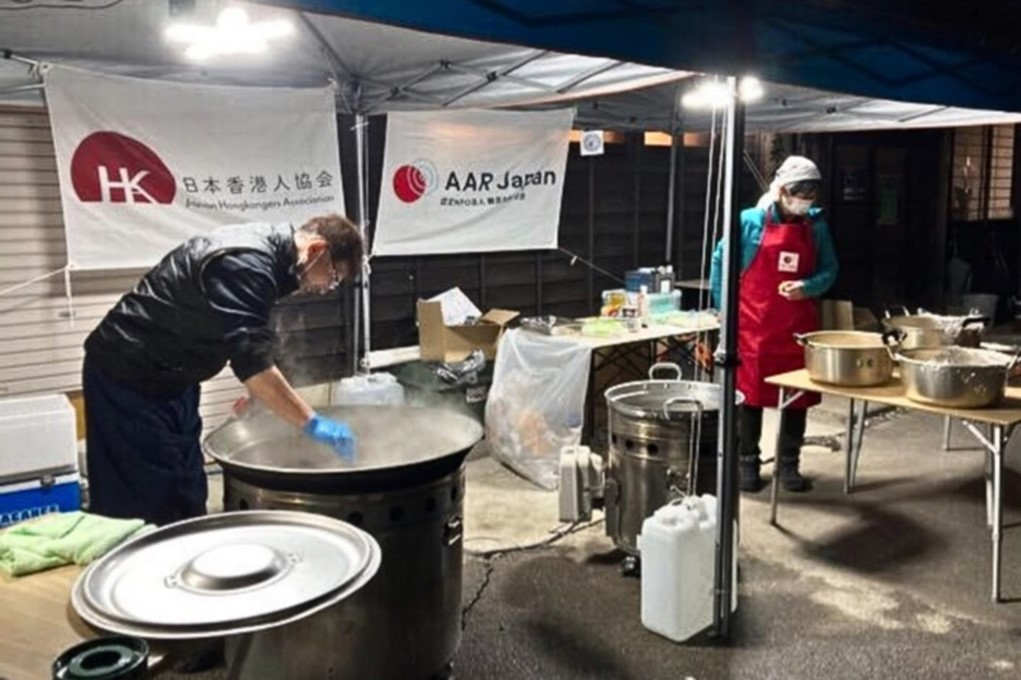 |
In addition to delivering hot meals to the affected regions, AAR also supported organizations serving individuals with disabilities, ensuring the continuity of their crucial services. |
| The road to the evacuation center was not yet secure. To either side was red and yellow signage indicating that structural damage had rendered the buildings along the road no longer safe or suitable for habitation. | 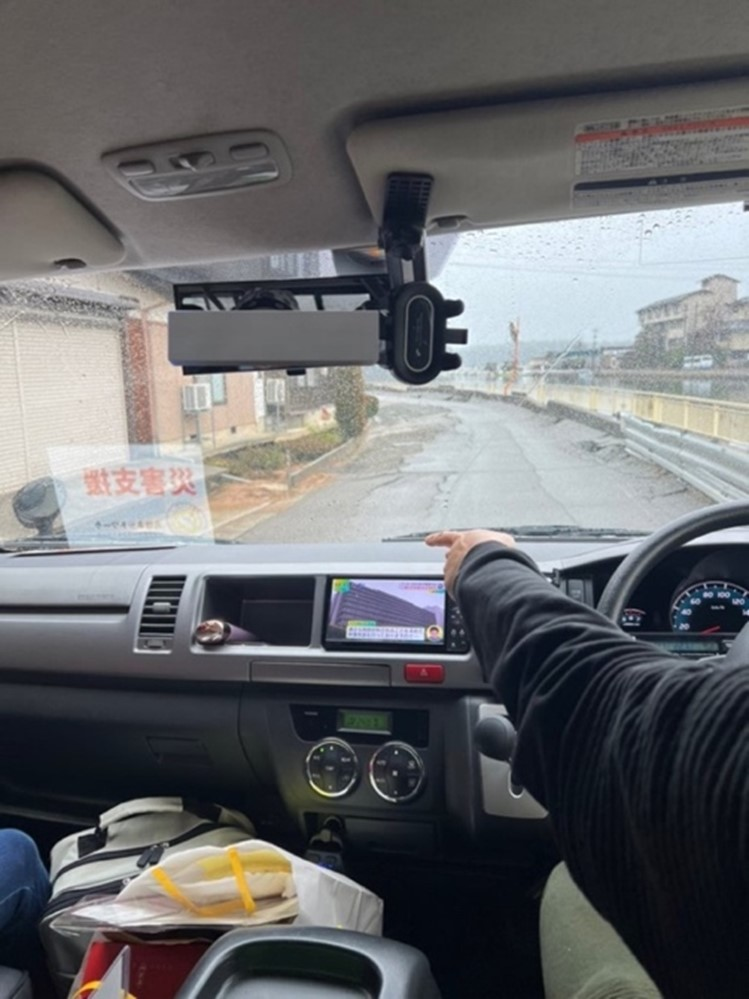 |
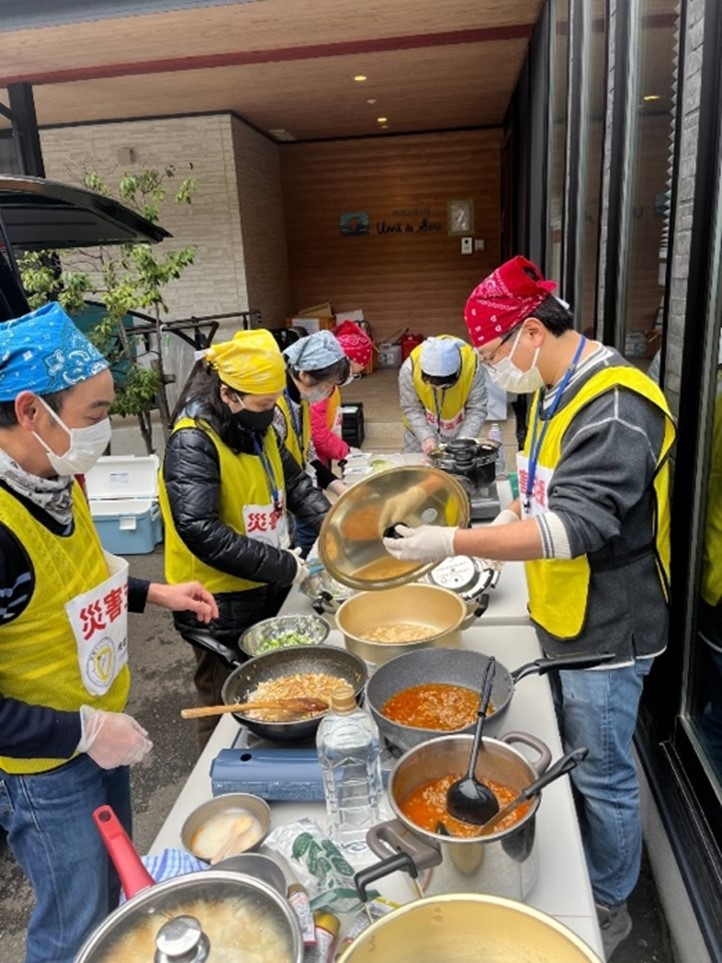 |
In Wajima, Hongkonger volunteers prepared meals using equipment they had brought with them to ensure that every essential item was available to provide comfort through food. |
| At an evacuation center in Anamizu-cho, volunteers prepared yakisoba for those affected by the earthquake. The vegetables were pre-cut, and the meat and noodles were precooked the day before to ensure quick and efficient meal service. | 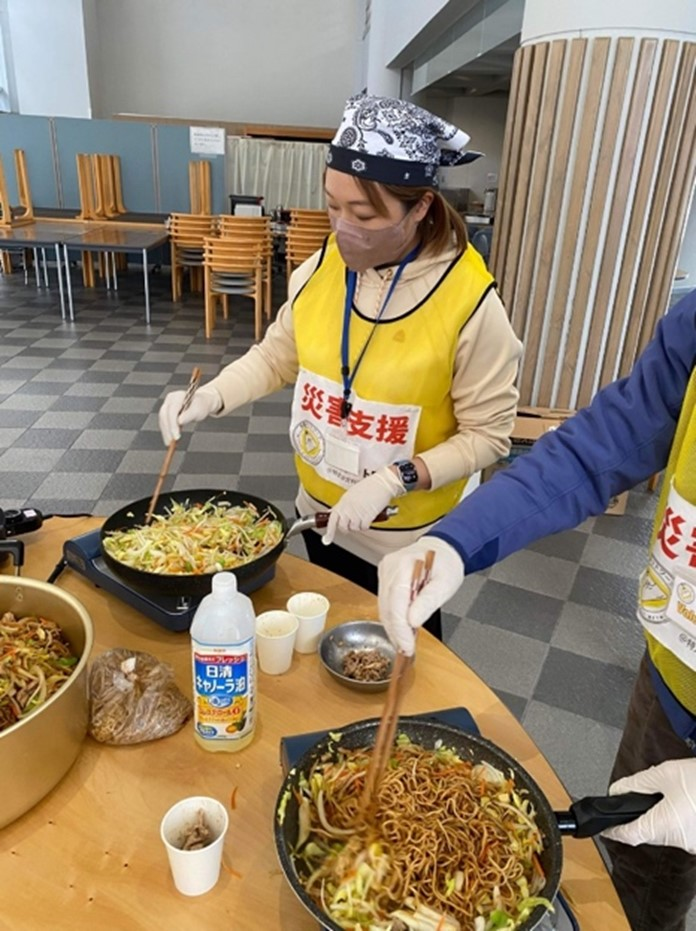 |
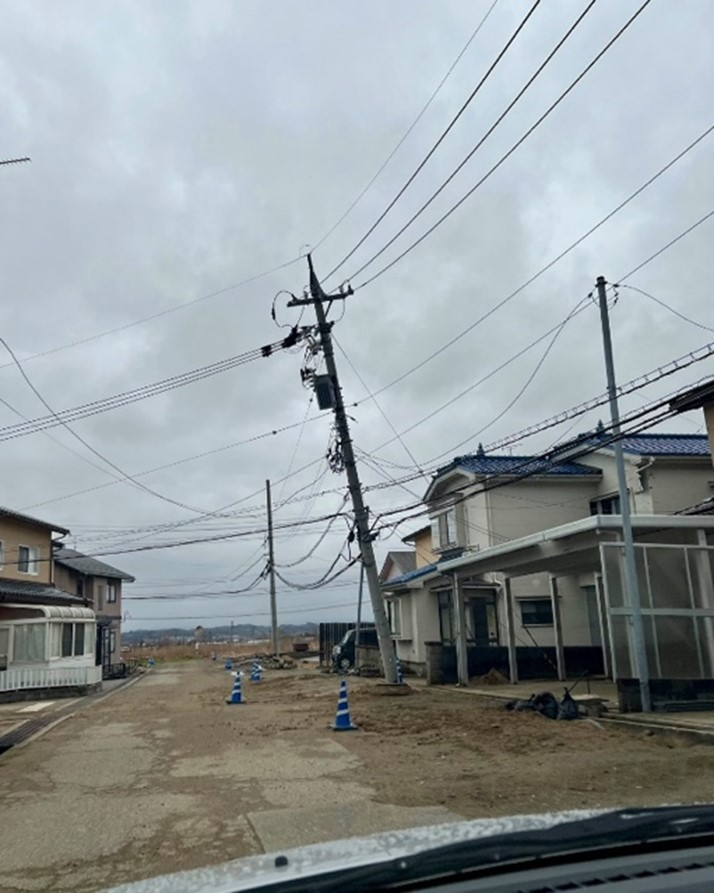 |
In Uchinada-cho, near the home of a Hongkonger family affected by the disaster, Hongkongers stand resilient as both victims and volunteers, reaching out to aid those in greater need. |
| After the meal service, a heartfelt moment unfolds as a volunteer connects with an earthquake survivor who expresses gratitude for the warmth and support offered during this difficult time. | 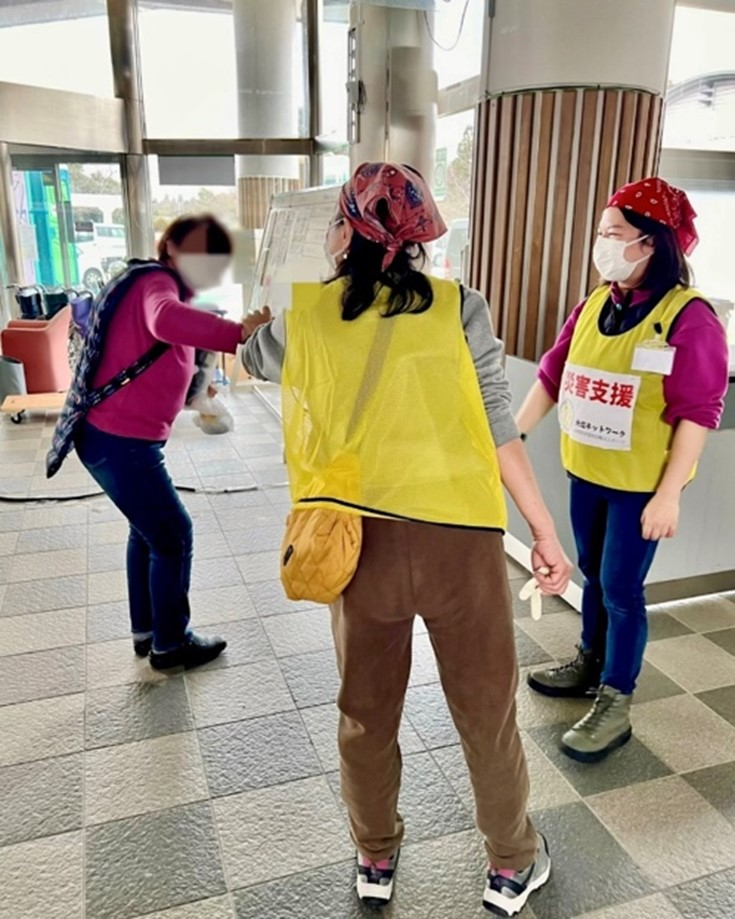 |
Anna Tanaka, born and raised in Hong Kong, pursued her university education in the UK and the US before gaining professional experience in the international business sector. Originally based in Hong Kong, she relocated to Japan in 2015. Since 2019, she has been organizing democratic activities for Hong Kong within Japan. Recognizing the significance of fostering a community among the Hong Kong diaspora in Japan, she co-founded the Japan Hongkongers Association in 2020. After serving as the representative director of the Japan Hongkongers Association, Anna currently holds the position of Director at the Association.
